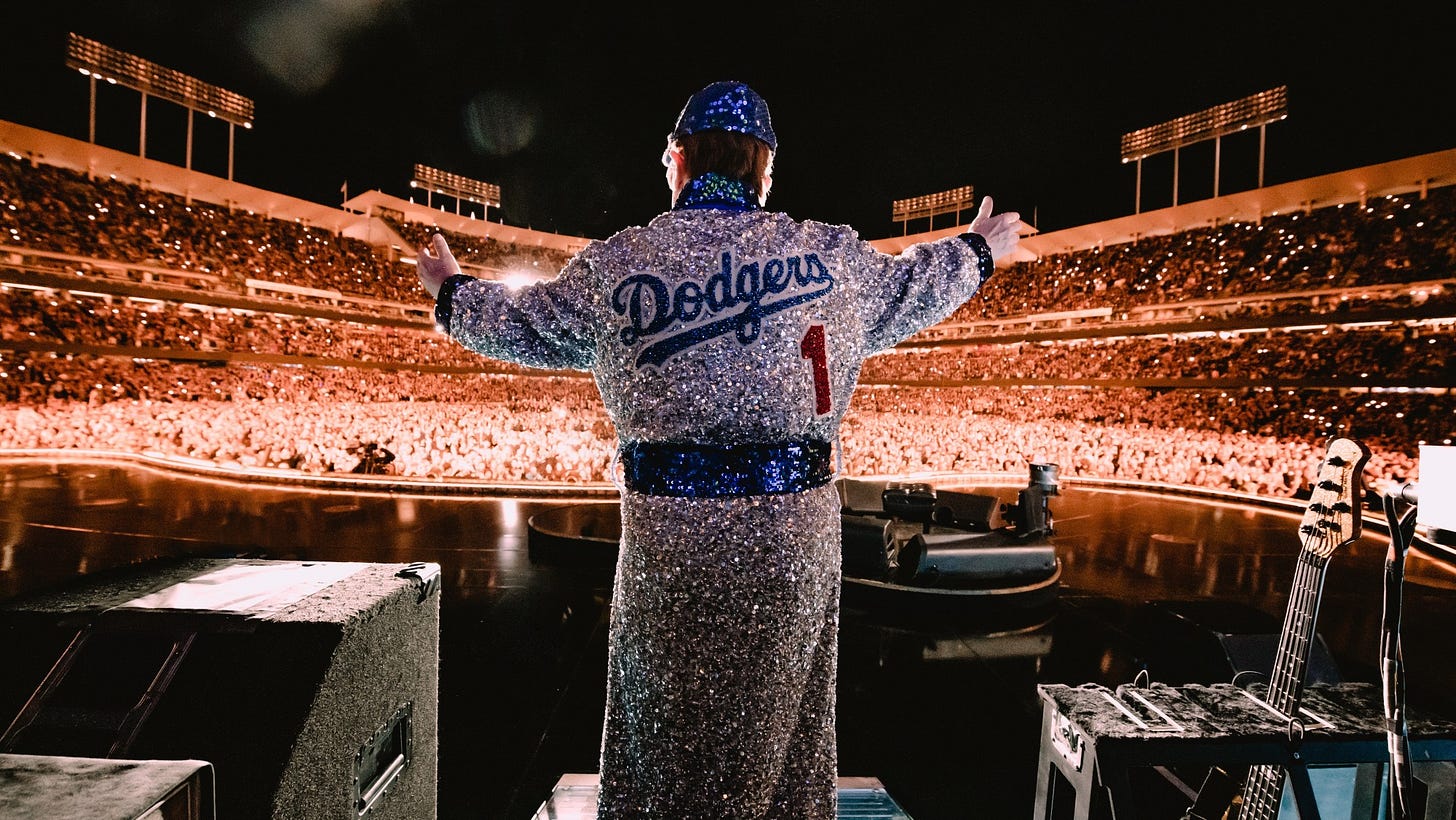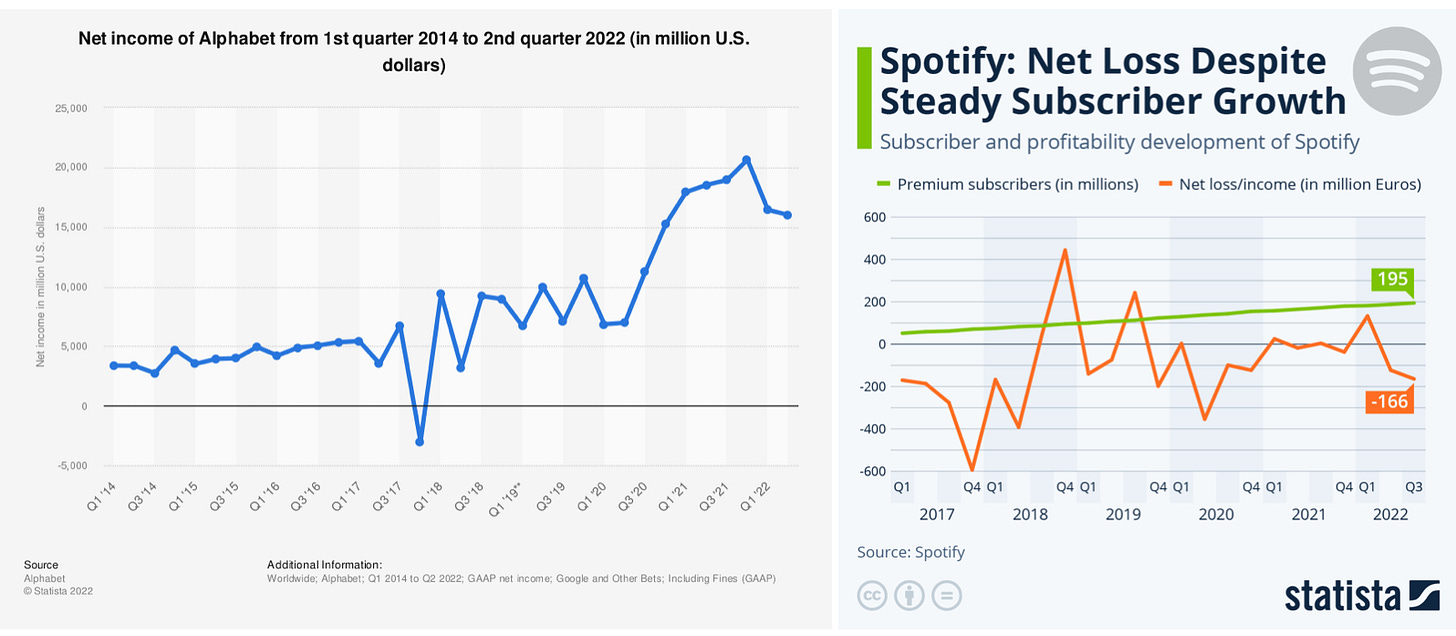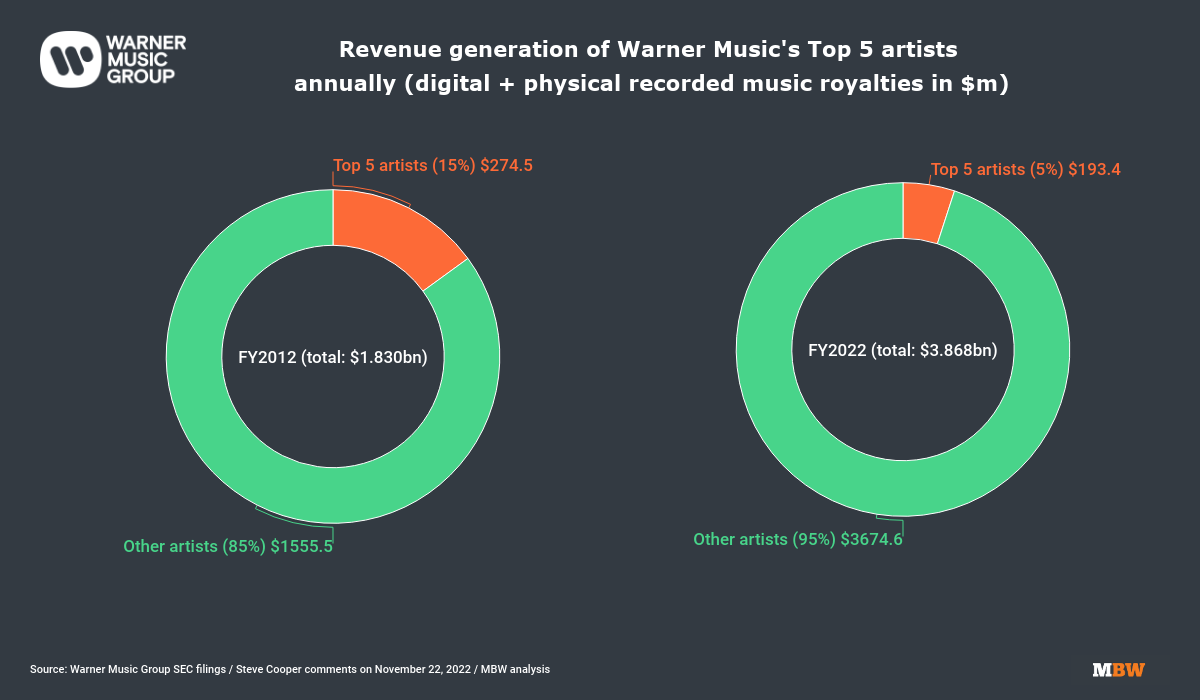🔮What Does 2023 Hold For The Music Industry?
With the dark clouds of an over-looming recession hanging high over pretty much every industry, what does the Music Business have in store for 2023?
We write a weekly newsletter on all things Music, and the Business and Tech behind it. If you’d like to get it directly in your inbox, subscribe now!
Happy Friday everyone!
It’s been a while since I’ve put out one of these as we’ve been busy building our iOS app & growing our Instagram page, which has blown up beyond measure- crossing 8k followers & reaching 20 Million + accounts in just the past 30 days 🤯
We’ve received great feedback from the community around how the app is shaping up, and can’t wait to bring it to you!
DM us on Instagram or reply here if you’re an iOS user & want to check out the app!
2022 Wrapped ⏯
2022 saw Live Music make a come-back as cities across the world re-opened & saw some of the biggest artists in the world such as Elton John, Bad Bunny, BTS & Dua Lipa perform to sold-out arenas 🏟

On the other hand, streaming continued its growth across all major regions, as users listened to more music than ever before, with over 1 Trillion streams across platforms just in the US 🇺🇸
Despite the global economy staring into the face of a recession as a result of the Russia-Ukraine war, interest rate hikes by Central Banks & soaring inflation across the world, consumption of music seemed to remain at an all time high 📈
In fact, services such as Spotify & Apple Music even announced price hikes for their subscription plans, indicating that music streaming has clearly become an essential commodity for most consumers & there exists enough willingness to pay.
Catalog acquisitions of artists by investment banks saw a slowdown as compared to 2021, but still remained strong with the likes of Sting & Justin Bieber cashing in their chips & selling copyrights to their music for hundreds of millions of dollars 🤑
So in what has overall been a positive year for the Music Industry as a whole, what could possibly change in 2023?
I personally believe the following 3 trends will play out in a big way in the coming year, as a result of underlying shifts in technology and culture 👇🏻
1) Generative AI Music 🤖
If 2022 marked the downfall of Crypto, with the Terra-Luna collapse & FTX scandal shaking the entire industry to its core, it also marked the mainstream adoption of Artificial Intelligence, especially generative text & image AI tools such as ChatGPT, DALL-E & Stable Diffusion.
With over half a billion users around the world having already used it once, ChatGPT- the viral AI chatbot built by OpenAI became the fastest digital product to reach a million users, accomplishing the feat in just 5 days! (Facebook took 10 months for reference).
Such has been the hype around this space, that Google had to issue ‘Code Red’ within the company last week, laying off over 12,000 employees and even bringing back founders Larry Page & Sergey Brin back from hiding, to focus all their efforts towards AI & ensure that Open AI bolstered from their partnership with Microsoft does not threaten the relevance of Google’s cash-printing search engine.
But what does this mean for the Music Industry?
Back in October 2022, I wrote a piece around the difference between music curated by AI vs humans & the approaches adopted by Spotify and Apple Music 👇🏻
However, this was before ChatGPT was launched, and a lot has changed in a couple of months.With hundreds of apps being built on top of the Large Language Models of companies like OpenAI, artists can now use AI for:
✍🏻 Writing lyrics
🎶 Getting inspiration for melodies
🎧 Creating entirely new songs from scratch
Which sort of replaces the artist themselves right?
There have been many promising applications building in this space- Mubert & MusicStar to name a couple, but it remains to be seen whether fans actually warm up to tracks created by AI, & if they even recognise the difference or care about it?
My take is that instead of entirely replacing them, these tools will help assist artists in writing lyrics, creating melodies & getting over the ‘Artist’s Block’, as a result increasing the number of people who create music.
Products like this that let users convert text-to-music instantly is just a sign of how things can change going forward 🤯
There are obvious questions around copyright & ownership of underlying data that such models use to generate new music, and how artists will get compensated for the same, but it’s still early days and the energy around this space is for real.
If the future of AI does play out as it’s proponents are touting, we could potentially be looking at one of mankind’s greatest ever inventions 🚀
Liked this so far? Sign up for our newsletter and get the latest in Music Business & Tech directly in your inbox every week!
2) Questioning Streaming’s Business Model 🤔
I’m far from a Music Industry guru, but having painstakingly analysed how this complicated web of Record Labels, Publishers, Streaming Platforms & Artists works, it’s pretty obvious that while streaming is the right product, it’s stuck in a bad business model ❌
Management 101 teaches any business to be analysed from the lens of ‘Value’, i.e-
How is value created by the company, and how is it captured?
For example: Google Search creates value by delivering a list of relevant web-page links when you search for something on the Internet, and captures value by charging advertisers to display their Ads to targeted users.
Similarly, Spotify creates value by enabling users to stream 100 million plus songs at their fingertips; and captures value by charging them a flat subscription fee along with charging advertisers to display Ads, depending on whether the user subscribes to the paid or free version.
On the face value, Google & Spotify’s business model look pretty much the same right?
Both enable users access to content in exchange for Ad money, in fact Spotify even charges for a premium version.
However, Google is projected to earn $65 Billion in profits for 2022, while Spotify lost around $200 Million during the same time period.
How’s that possible?
Notwithstanding that Google is used by roughly a billion people, and has multiple other products such as their Cloud services, YouTube, Smartphones & the entire Android platform; whereas Spotify just has their music streaming platform used by 400 million plus people, there’s a fundamental difference between Google & Spotify which shows in their margins.
Google boasts of around 60% in Gross Margins, compared to Spotify’s 25%, meaning that for every dollar earned by Google from advertisers, it gets to keep 60 cents whereas for every dollar that Spotify makes from subscriptions & Ads, it only gets to keep 25 cents 💰
Why so?
Unlike Google, Spotify has to license the content it serves on its platform- i.e. the music- from the Record Labels, who have managed to strike very favourable deals for themselves and have the upper hand in deciding the terms with Spotify.
I know this is a bit like comparing apples with oranges because Google is a different product and also has to pay news publishers for their content; however, it’s nothing compared to Spotify which gives away almost 75% of all revenue they make to the Major Labels, & has its hands tied as it doesn’t own the content on its platforms.
Benn Jordan, an electronic artist & YouTube influencer from the US who I covered previously for exposing a scam by a Pulitzer winning journalist made this video outlining why he believes Spotify is eventually doomed as a business 👇🏻
I’m the last person to dunk on a successful company with a great product & engineering culture like Spotify, but it does seem like they’re under massive pressure to improve their margins and become more efficient as a business.
In fact, just this week they laid off around 6% of their global workforce, following other Tech giants like Amazon, Microsoft & Google as it aims to drive efficiency and focus more on profitability.
2023 could be the year where investors finally start asking serious questions about the viability of music streaming’s business model.
3) Changing definition of a ‘Superstar’
As per a stat revealed by Warner Music Group, over the past 10 years, the contribution of their Top 5 biggest artists to total revenue fell down from 15% to 5%.
What does this mean?
From 2012 to 2022, while Warner observed its overall revenue more than doubling from $1.8 Billion to $3.8 Billion, their Top 5 artists were contributing almost 3 times less to that figure.
Clearly, the definition of the stereotypical ‘Superstar’ is shifting.
Don’t get me wrong- the biggest stars such as Drake & Taylor Swift are still the ones making the most money, but there’s a rising tide of the ‘middle class’ of artists that are beginning to climb into user’s playlists & libraries.
Growth of streaming, better personalisation of recommendation algorithms and platforms like TikTok & Instagram blowing unknown artists up overnight will only increase this ‘middle class’ of artists, which could have interesting implications for the relationship between fans & artists going forward.
Our thoughts on this?
Despite the overall gloom and doom in the economy, there hasn’t been a better time to build something in the Music Industry.
I believe 2023 will be the year where we see the first application which uses AI to create value & Crypto to capture it.
Imagine a world where users create new music using text-based prompts, and monetise it directly from fans using NFT’s or token, proving that AI & Crypto are not movements at battles with each other, but rather two sides of the same coin!


We’re building for this very future at Incentify, and can’t wait to share more details in the coming months 🫡
Meanwhile, have a great weekend everyone 🍻
If you liked this newsletter from Incentify, why not share it with someone you like?
P.S- Follow us on Instagram and Twitter for more such content on all things Music and Culture, now!






